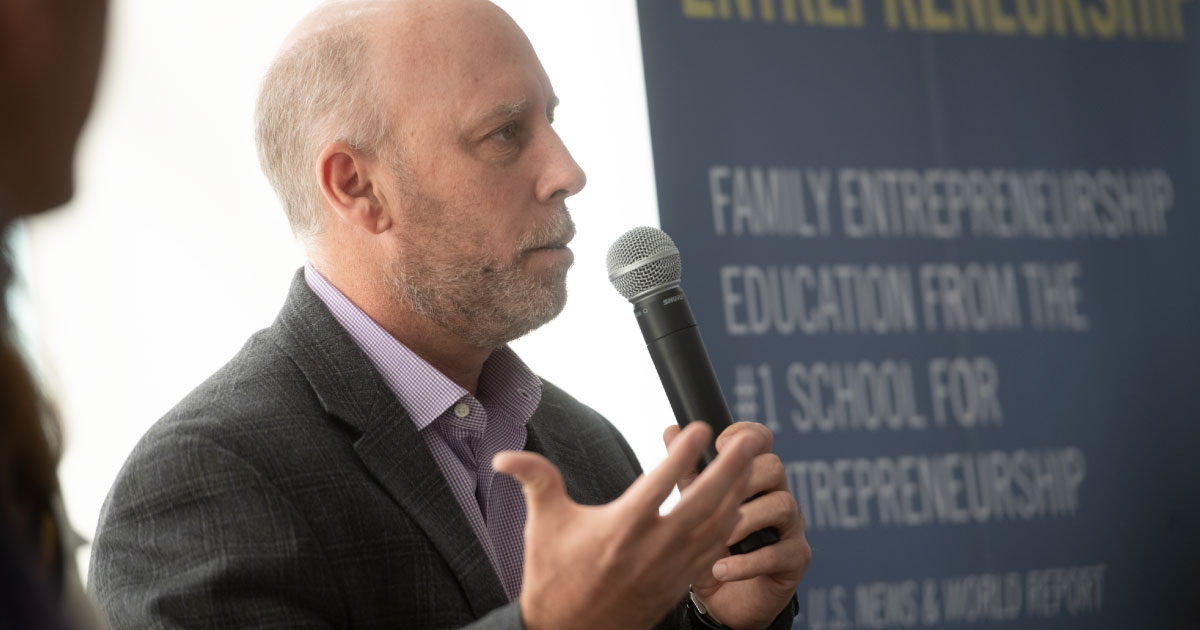Behind the Curtain of a Family Business

Family businesses don’t like drama, and they especially don’t like sharing it with outsiders. Read The Wall Street Journal, says Matt Allen, associate professor of entrepreneurship, and you will rarely see anything about the inner workings of a family business.
“You keep family close,” says Allen, who serves as faculty advisor of Babson’s Institute for Family Entrepreneurship. “Family businesses are notoriously tight-lipped about problems, issues, and whatever they are struggling with.”
That’s what made a recent campus event held at Park Manor West such a rare occasion. As part of the institute’s Live Case Study series, Nick Ragland MBA’00 lifted the veil on his family business, the Gorilla Glue Corp.
Ragland described the leadership and succession challenges facing his company, a Cincinnati-based provider of adhesives, tapes, and sealants. He spoke before an engaged crowd eager to hear about family entrepreneurship from the inside. “Whenever you can get someone who can come in and share what they’re going through, it’s a learning opportunity,” Allen says.
Put the Business First
If a family business is faced with a problem, Ragland had a piece of advice: Put the company first. “You have to do what is in the best interest of the business,” he says. “Once you make it about an individual or a family line, bad things can happen.”
Ragland began the Live Case Study by giving some company history. He took attendees back to 1983, when his father, Nick Sr., bought a small hand-tool venture called Lutz Tool. At the time, Lutz had just a handful of employees.
Business grew through the years, though, and the company would go on to make two key acquisitions, buying a then small adhesive company, Gorilla Glue, which the family business would eventually adopt as its name, and later O’Keeffe’s skin care products.
Today, Gorilla Glue is a global company with more than 650 employees. While Nick Sr. retired from the family business in 2002, Nick and his four brothers are all still involved. The brothers work well together, but as Gorilla Glue continues to grow and becomes more difficult to manage, there are worries about the future.
Of particular concern, explained Nick Ragland, is the fact that he and brother Pete have been serving as co-presidents. Could having two presidents create confusion and a lack of focus? “The business has gotten more complicated in recent years,” says Ragland. “We’ve been talking about whether the two-president model is a good one. It’s worked fine, but we’ve seen some cracks in it.”
Someone Else’s Shoes
Live Case Studies are interactive, so once Ragland finished speaking, the attendees broke into groups to role-play and discuss the company’s future. They looked at Gorilla Glue’s structure, and considering that the Ragland brothers have 15 children among them, they also considered what the role of the next generation should be.
Many of those in attendance were involved with family businesses themselves, including students and parents taking part in the institute’s Family Entrepreneurship Amplifier program, an immersive experience for students looking to become involved in a family enterprise.
Gorilla Glue was just the latest Live Case Study they were able to attend. Earlier in the school year, Live Case Studies focused on a global wealth management office and an apparel manufacturer in Sri Lanka. “Babson is all about active learning,” says Lauri Union, the institute’s executive director. “Live Case Studies are an opportunity to learn directly from a family entrepreneur. You get to be in someone else’s shoes.”
Ragland decided to participate in the Live Case Study because he believes in the power of family to create thriving businesses. “I think Babson’s focus on family and entrepreneurship is very valuable,” he says. “Events like this have a real purpose.”
Posted in Community, Entrepreneurial Leadership




